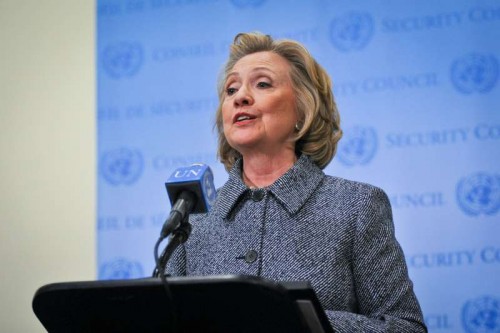
By Arun Kumar
Hillary Clinton’s presidential campaign is facing new questions with a report claiming the Clinton Foundation distributed useless drugs made by an Indian company to AIDS patients and another challenging the authenticity of her twitter followers.
Conservative news site WorldNetDaily (WND) alleged her family philanthropy’s Clinton Health Aids Initiative (CHAI) worked closely with Indian pharmaceutical company Ranbaxy to distribute “drastically substandard” generic antiretroviral drugs to Third World countries.
The Clintons appear to have personally profited from an airline-ticket levy programme run by the UN group UNITAID that used the Clintons’ international prestige to “leverage” manufacturers of prescription quality drugs and health-care products and sell them to developing countries at a discount price, it said.
Citing a Wall Street analyst, WND said Ira Magaziner, the chief executive officer and vice chairman of CHAI, approached Ranbaxy in 2002 to negotiate a deal.
CHAI proposed to Ranbaxy that “they could put the developing countries together to form a sort of ‘buying club’ that could “ramp up economies of scale and lower cost,” it said citing a 2013 book “AIDS Drugs for All.”
Meanwhile, Forbes magazine reported Monday that approximately 62 percent of the former Secretary of State’s Twitter “followers are potentially either bogus or inactive.”
By this measure, of her nearly 3.4 million followers, 2.1 million likely never view her tweets, it said.
Interestingly, Clinton also follows the fewest people, has issued the fewest number of tweets and was the last politician of the potential 2016 field to join Twitter, Forbes said.
Meanwhile, according to a report in the Washington Post Monday, two leading charity watchdogs have split in their assessments of the Clinton Foundation’s spending practices.
In a new rating published Monday, the American Institute of Philanthropy’s Charity Watch gave the foundation an “A” rating for financial performance.
But a second group, Charity Navigator, citing potential issues that could concern donors placed the foundation on a “watch list”.
On Sunday the family philanthropy founded by former President Bill Clinton in 2001, admitted that it made mistakes in how it disclosed its foreign donors.
Even as it claimed that its “donor disclosure and foreign government contributor policy is stronger than ever,” acting CEO Maura Pally said in a blog post: “So yes, we made mistakes, as many organizations of our size do.”
“But we are acting quickly to remedy them, and have taken steps to ensure they don’t happen in the future,” she said defending the work of the organisation.
“We are committed to operating the Foundation responsibly and effectively to continue the life-changing work that this philanthropy is doing every day,” Pally said.
Since Hillary Clinton “decided to run for President, we have committed to disclosing all of our donors on a quarterly basis,” she said.
In addition, the foundation “will only accept funding from a handful of governments, many of whom the Foundation receives multi-year grants from, to continue the work they have long partnered on.”